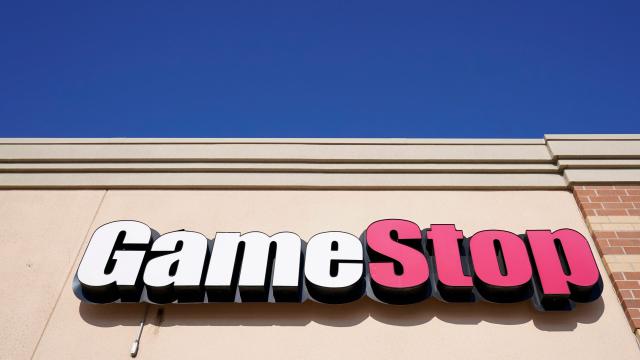The U.S. Securities and Exchange Commission broke its silence Friday morning on the populist investor uprising that has sent the stock price of beleaguered retailer GameStop “to the moon,” warning everyone involved that they are watching… and, for the time being, not doing a whole lot else, it seems.
“The Commission will closely review actions taken by regulated entities that may disadvantage investors or otherwise unduly inhibit their ability to trade certain securities,” the joint statement from acting SEC Chair Allison Herren Lee and the three commissioners.
[referenced id=”1668258″ url=”https://gizmodo.com.au/2021/01/google-deletes-100000-negative-reviews-of-robinhood-app-from-angry-users/” thumb=”https://gizmodo.com.au/wp-content/uploads/2021/01/29/bt4mugzzztjkpq0xd9m0-300×168.jpg” title=”Google Deletes 100,000 Negative Reviews of Robinhood App From Angry Users” excerpt=”Google removed at least 100,000 negative reviews of the stock trading app Robinhood from the Google Play app store after angry users sent a flood of critical reviews that caused the app’s rating to plummet on Thursday. The app’s rating went from roughly four stars out of five on Wednesday…”]
This mushy but ominous statement is directed at Robinhood, E*Trade, Charles Schwab, and TD Ameritrade, all of which restricted GameStop and other stocks this week as investors got swept up in the fervor of screwing over hedge funds by purchasing stock in beleaguered companies that wealthy investors bet would drop in value. However, the SEC also cautioned investors against taking part in investing schemes that may be illegal.
“In addition, we will act to protect retail investors when the facts demonstrate abusive or manipulative trading activity that is prohibited by the federal securities laws,” the statement continued. “Market participants should be careful to avoid such activity. Likewise, issuers must ensure compliance with the federal securities laws for any contemplated offers or sales of their own securities.”
It’s not only the SEC that has its eye on this fiasco: Committee chairs in both the House and Senate on Thursday announced plans to hold hearings on either the Robinhood/GameStop situation specifically or the state of the stock market more generally.
Robinhood, which offers users commission-free access to the market and relatively few fees, began allowing limited trades of GameStop and other companies’ stock on Friday — but not before being sued by its own users, suffering a flood of negative reviews of its app, and reportedly rushing to raise more than $US1 ($1.5) billion in new investment to cover the cash crunch caused by the flurry of trading activity over the past week.
The tale of GameStop’s viral stock begins with the presumably small-time investors of WallStreetBets, who theorised that they could force huge losses for Melvin Capital and other hedge funds that had made significant bets against GameStop. The gamble worked. By pumping money into GameStop — a brick-and-mortar video game retailer that has struggled amid the pandemic and the proliferation of downloadable games — WallStreetBets traders created a so-called “short squeeze,” which pushed GameStop’s stock price to ludicrous heights and caused an estimated $US70 ($91) billion in losses for short sellers like Melvin.
The returns alleged by some Redditors created a David vs. Goliath narrative, where small-timers were able to beat bigwigs with billions of dollars at their disposal; the sudden heel-turn of Robinhood and other trading platforms, however, confirmed the obvious financial reality that the market largely exists for the rich to maximise their wealth while preventing the 99% from doing the same. But the story is not yet over.
[referenced id=”1668037″ url=”https://gizmodo.com.au/2021/01/robinhood-sued-by-furious-gamestop-stockholders/” thumb=”https://gizmodo.com.au/wp-content/uploads/2021/01/29/njze4ojscahx0pqmyehl-300×169.jpg” title=”Robinhood Sued by Furious GameStop Stockholders” excerpt=”Stock-trading app Robinhood now faces a class-action lawsuit after it blocked stock purchases of GameStop and other companies favoured by Reddit’s WallStreetBets community on Thursday morning.”]
What happens next is anyone’s guess, but most observers seem to agree that GameStop (and AMC, and BlackBerry, and any other stock inflated by the WallStreetBets ethos) will eventually crash back down to Earth. Those who bought low and sell high — GameStop is back up more than 90%, as of this writing, after closing at around $US193 ($252) on Thursday — will make bank. Short sellers will once again cash in on the falling stock price. And the true believers — investors who bought GameStop stock not to make money but to “send a message” about the unfairness of the system — will be left to figure out their next move.
Of course, that just leaves the most vulnerable group: investors who bought stocks while the price was high and fail to jump ship before their investments vanish into the ether. As the SEC warned on Friday, “extreme stock price volatility has the potential to expose investors to rapid and severe losses and undermine market confidence.”
In response to this obvious reality — investing can be risky! everyone knows that! — some users on WallStreetBets are challenging the U.S. federal government to bail out GameStop stockholders as it did for big banks after their own risky bets caused the 2008 crash. While the SEC vowed in its statement to protect retail investors and members of U.S. Congress on both sides of the aisle are acting outraged on behalf of small-time investors, counting on a government bailout is clearly a bad bet.
